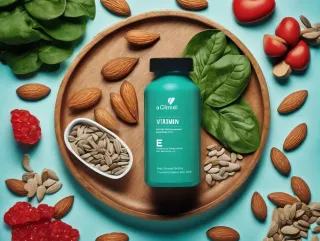Introduction
Vitamin E is a powerful, fat-soluble antioxidant that has long been a topic of interest for its potential role in promoting heart health. Historically, it was believed that its ability to combat oxidative stress could translate into significant cardiovascular benefits, helping individuals achieve an optimal heart function. However, while the theory is compelling, decades of rigorous scientific research have painted a more complex picture. This article delves into the evidence, exploring the proposed benefits, actual clinical outcomes, and current recommendations regarding vitamin E supplementation for heart disease.
What is Vitamin E?
Vitamin E is not a single compound but a group of eight related fat-soluble compounds, with alpha-tocopherol being the most biologically active form in humans. Its primary role is to act as an antioxidant, protecting cell membranes from damage caused by free radicals—unstable molecules that contribute to aging and disease National Institutes of Health, 2021. This protective mechanism is why researchers initially hypothesized that vitamin E could prevent or slow the progression of chronic diseases linked to oxidative stress, such as atherosclerosis (the hardening of arteries), a primary driver of heart disease.
Benefits and Outcomes in Heart Disease
The initial excitement surrounding vitamin E for heart health was based on its potential to prevent the oxidation of low-density lipoprotein (LDL) cholesterol. Oxidized LDL is a key factor in the development of arterial plaque, which can lead to heart attacks and strokes. Early observational studies suggested that individuals with higher dietary intake of vitamin E had lower rates of heart disease. However, large-scale, randomized controlled trials (RCTs)—the gold standard of medical research—have largely failed to replicate these findings. Major studies have shown that vitamin E supplementation does not significantly reduce the risk of heart attack, stroke, or death from cardiovascular disease in people with pre-existing heart conditions or in healthy individuals The Heart Outcomes Prevention Evaluation Study Investigators, 2005. In fact, some evidence suggests high doses may be ineffective or even carry risks.
Research Insights
Decades of research have provided a clear, albeit disappointing, consensus on vitamin E supplementation for cardiovascular disease prevention.
- The HOPE-TOO Trial, a landmark study, followed over 9,500 patients at high risk for cardiovascular events. It found that long-term supplementation with 400 IU of vitamin E daily had no effect on the incidence of heart attacks, strokes, or cardiovascular deaths. It did, however, find a significant increase in the risk for heart failure The Heart Outcomes Prevention Evaluation Study Investigators, 2005.
- A comprehensive meta-analysis published in the Annals of Internal Medicine reviewed 19 clinical trials and concluded that high-dosage vitamin E supplements (≥400 IU/day) may increase the risk of all-cause mortality Miller et al., 2005.
- Reflecting this body of evidence, a 2023 review in the Journal of the American College of Cardiology and guidelines from the American Heart Association explicitly state that routine supplementation with vitamin E is not recommended for the prevention of cardiovascular disease Jenkins, D. J. A., et al., 2023; American Heart Association, 2022.
Practical Applications
Given the scientific consensus, the best approach to obtaining vitamin E is through diet, not supplements.
- Dietary Sources: Excellent food sources of vitamin E include nuts (almonds, hazelnuts), seeds (sunflower seeds), vegetable oils (sunflower, safflower oil), and green leafy vegetables (spinach, broccoli). A balanced diet typically provides sufficient vitamin E for most people National Institutes of Health, 2021.
- Supplementation and Dosage: The Recommended Dietary Allowance (RDA) for adults is 15 mg (22.4 IU) of alpha-tocopherol. While the Tolerable Upper Intake Level (UL) is 1,000 mg/day (approx. 1,500 IU), research indicates that doses as low as 400 IU/day may be associated with increased risks and provide no cardiovascular benefit. Therefore, supplementation for heart health is not advised for the general population.
Risks & Limitations
Beyond the lack of benefit for heart disease, high-dose vitamin E supplementation carries specific risks:
- Increased Bleeding Risk: Vitamin E can interfere with the body's ability to clot blood by antagonizing vitamin K. This can increase the risk of bleeding, a significant concern for individuals taking anticoagulant medications like warfarin National Institutes of Health, 2021.
- Increased All-Cause Mortality: As noted, a major meta-analysis found that high-dose supplementation was associated with a small but statistically significant increase in the risk of death from any cause Miller et al., 2005.
- Hemorrhagic Stroke: Some studies have linked high-dose vitamin E to an increased risk of hemorrhagic stroke (bleeding in the brain).
Key Takeaways
- Vitamin E is an essential antioxidant, but its benefits are best obtained through a healthy diet.
- Large-scale clinical trials have consistently shown that vitamin E supplements do not prevent heart attacks, strokes, or cardiovascular death.
- High-dose vitamin E supplementation (≥400 IU/day) is not recommended and may increase the risk of all-cause mortality and heart failure.
- The American Heart Association and other major health organizations advise against using vitamin E supplements for heart disease prevention.
- Always consult a healthcare provider before starting any new supplement regimen.
Frequently Asked Questions
1. Can taking vitamin E prevent a heart attack?
No. Major clinical trials have demonstrated that vitamin E supplementation does not prevent heart attacks in high-risk individuals or in the general population The Heart Outcomes Prevention Evaluation Study Investigators, 2005.
2. What is a safe amount of vitamin E to take?
The recommended daily intake for adults is 15 mg (22.4 IU), which is easily met through a balanced diet. High-dose supplements are associated with health risks and are generally not recommended unless prescribed by a doctor for a specific condition National Institutes of Health, 2021.
3. Should I take a vitamin E supplement for my heart?
No. Based on current scientific evidence, major health organizations like the American Heart Association do not recommend vitamin E supplements for preventing heart disease American Heart Association, 2022.
Suggested Links
External Links:
Conclusion
While vitamin E remains an essential nutrient for overall health, the initial hope that high-dose supplements could help achieve an optimal heart has not been borne out by science. The evidence is clear: vitamin E supplementation does not prevent cardiovascular disease and may even pose risks at high doses. The most effective and safest strategy for supporting your heart health is to focus on proven methods: a balanced diet rich in whole foods, regular physical activity, and avoiding smoking. Instead of reaching for a supplement bottle, focus on incorporating vitamin E-rich foods like almonds, sunflower seeds, and spinach into your meals. Always consult with your healthcare provider to create a personalized plan for your cardiovascular well-being.
References
Jenkins, D. J. A., et al. (2023). Vitamin and Mineral Supplements for Cardiovascular Disease Prevention. Journal of the American College of Cardiology. https://www.jacc.org/doi/10.1016/j.jacc.2023.02.014
American Heart Association. (2022). Antioxidant and Cardiovascular Disease. heart.org. https://www.heart.org/en/healthy-living/healthy-eating/eat-smart/nutrition-basics/antioxidants-and-cardiovascular-disease
National Institutes of Health, Office of Dietary Supplements. (2021). Vitamin E: Fact Sheet for Health Professionals. ods.od.nih.gov. https://ods.od.nih.gov/factsheets/VitaminE-HealthProfessional/
Miller, E. R., et al. (2005). Meta-analysis: high-dosage vitamin E supplementation may increase all-cause mortality. Annals of Internal Medicine. https://www.acpjournals.org/doi/10.7326/0003-4819-142-1-200501040-00110
The Heart Outcomes Prevention Evaluation Study Investigators. (2005). The HOPE-TOO Trial Investigators. Effects of long-term vitamin E supplementation on cardiovascular events and cancer: a randomized controlled trial. JAMA. https://jamanetwork.com/journals/jama/fullarticle/200644




